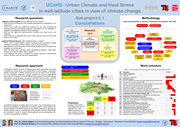Research Module 5.1 Constellations
General
Urban planners and policy-makers do not possess sufficient information to cope adequately with the challenges of urban heat stress. The core objective of Research Module 5.1 is to identify promising approaches to good governance in planning and decision-making tied to the challenge of urban heat stress. Identifying appropriate mitigation and adaptation strategies requires an awareness of the roles played by various actors, institutions, legal and economic contexts. It is necessary to identify the forces driving as well as impeding radical, incremental and additive innovation processes.
Making use of the data, hypotheses and interim outcomes of the other RMs, we explore the constellations that deal best with urban heat stress. Many good practices are emerging, but our empirical and theoretical understandings remain insufficient. A comprehensive methodology known as "Constellation Analysis" will be applied to identify changes in planning and governance that can contribute to mitigating and adapting to urban heat stress. This interdisciplinary bridging concept involves understanding not only the natural environment, but also the relationships among human stakeholders, technical developments, and control systems (e.g. regulations, taxes).
Collaboration within Research Links (RL)
| 470 | Political and societal influences on vulnerability to heat stress |
| 490 | Urban climate projections |
Collaboration within Research Cluster (RC)
| 530 | Effectiveness of actions for reducing heat-stress risks |
| 540 | Efficiency of actions for reducing heat-stress risk |
